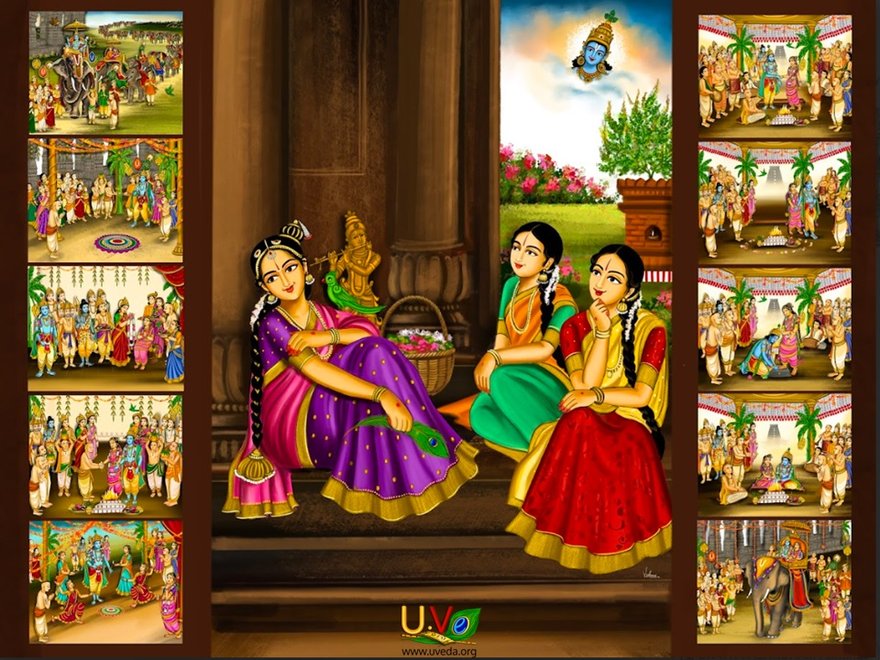NAT 6.11
They Will Rejoice, Being Blessed with Good Children
நன்மக்களைப் பெற்று மகிழ்வர்

566 ஆயனுக்காகத் தான்கண்டகனாவினை *
வேயர்புகழ் வில்லிபுத்தூர்க்கோன்கோதைசொல் *
தூயதமிழ்மாலை ஈரைந்தும்வல்லவர் *
வாயுநன்மக்களைப்பெற்று மகிழ்வரே. (2)
வேயர்புகழ் வில்லிபுத்தூர்க்கோன்கோதைசொல் *
தூயதமிழ்மாலை ஈரைந்தும்வல்லவர் *
வாயுநன்மக்களைப்பெற்று மகிழ்வரே. (2)
NAT.6.11
566 ## āyaṉukkākat * tāṉ kaṇṭa kaṉāviṉai *
veyar pukazh * villiputtūrkkoṉ kotai cŏl **
tūya tamizhmālai * īraintum vallavar *
vāyum naṉ makkal̤aip pĕṟṟu * makizhvare (11)
veyar pukazh * villiputtūrkkoṉ kotai cŏl **
tūya tamizhmālai * īraintum vallavar *
vāyum naṉ makkal̤aip pĕṟṟu * makizhvare (11)
Ragam
Kalyāṇi / கல்யாணி
Thalam
Jambai / ஜம்பை
Bhavam
Nāyaki (lovelorn lady)
Simple Translation
566. Kodai, the daughter of the chief of Villiputhur,
praised by the family of Vediyars,
composed a garland of ten Tamil pāsurams
that describe the dream of her marriage with, Lord Kannan,
the cowherd.
Those who learn and recite these ten pāsurams written in chaste Tamil will be blessed with good children and find happiness.
Word by Word (WBW) meaning
(The words may be rearranged to facilitate conversion from poetry to prose (Aṉvayam). Please read the meanings (in black) continuously to form the sentence and understand the simplified meaning based on the Divyārtha Dīpikai for the verse.)
வேயர் புகழ் — வேயர் குலத்தவர் புகழும்; வில்லிபுத்தூர் — ஸ்ரீவில்லிபுத்தூர்; கோன் — பெரியோனின் மகள்; கோதை — கோதை; தான் — தான்; ஆயனுக்காக — கண்ணனுக்கானவள் என்று; கண்ட கனாவினை — கனவு கண்டதை; சொல் — அருளிச்செய்த; தூய தமிழ் — தூய தமிழ்; மாலை — பாசுரங்களான; ஈரைந்தும் — இப்பத்துப் பாசுரங்களையும்; வல்லவர் — ஓதவல்லவர்கள்; வாயும் நன் — நற்குணகங்களமைந்த; மக்களை — மக்களை; பெற்று மகிழ்வரே — பெற்று மகிழ்வர்
kotai — Kodai (Andal); koṉ — the daughter of Periazhwar of; villiputtūr — Sri Villiputhur that is; veyar pukaḻ — prasied by Veic scholars; cŏl — composed; mālai — these hymns; tūya tamiḻ — in pure tamil; kaṇṭa kaṉāviṉai — about her dream of; tāṉ — her; āyaṉukkāka — marrying Kannan; vallavar — those who recite; īraintum — thse ten pasurams; pĕṟṟu makiḻvare — will be blessed with; vāyum naṉ — good hearted; makkal̤ai — children
Detailed Explanation
Avathārikai (Introduction)
In this, the final pāśuram of the sacred chapter, our divine mother, Śrī Āṇḍāḷ, mercifully reveals the glorious fruits (phalaśruti) that are bestowed upon those who lovingly recite these verses, thus bringing this divine garland of songs to its blessed conclusion.
Anvaya Artham (Simplified Meaning)
This sacred verse was